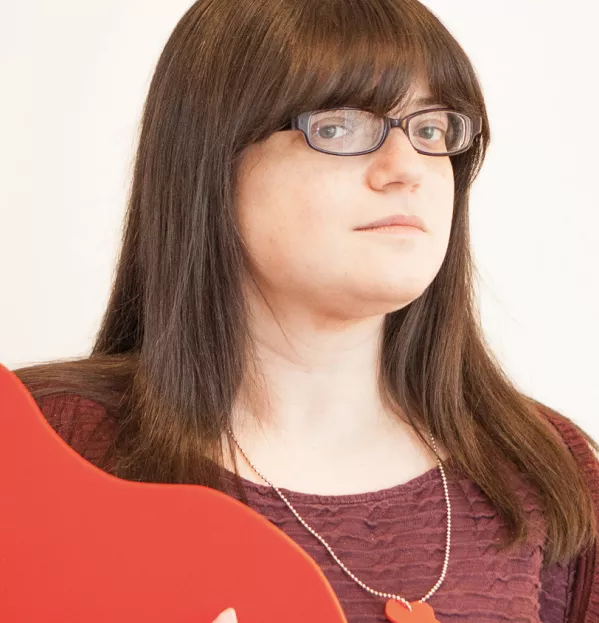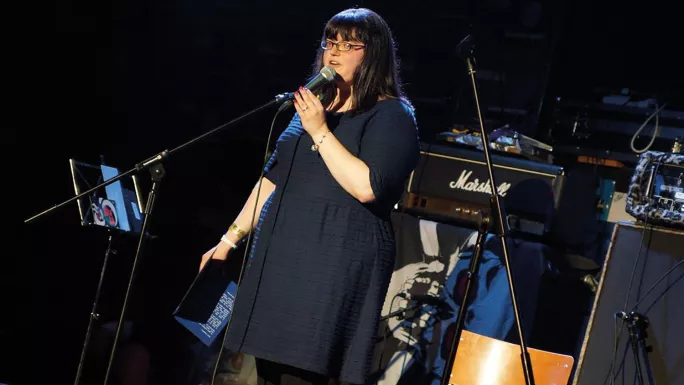TES talks to...Chella Quint

Chella Quint spent the first years of her teaching career leading a secret double life. By day, she was a drama teacher and her school’s “go-to” person for PSHE; by night she was performing stand-up comedy about periods and addressing the misconceptions promoted by adverts for menstrual products.
“My lessons were rated ‘outstanding’ by Ofsted, I was creating schemes of work the kids were really enjoying, and I was feeling confident as a teacher. But in my free time, I was doing comedy and street art and working on fanzines - I never stopped doing that kind of DIY punk thing. It took the edge off being a new teacher,” says Quint.
‘Menstruation education simply wasn’t good enough’
These days, Quint’s alter ego is no longer a secret. She’s delivered a five-star-reviewed comedy show at the Edinburgh Fringe, and her TEDx talk “Adventures in Menstruating: don’t use shame to sell” has racked up more than 15,000 views on YouTube. Having recently left teaching, she now works as a teacher researcher for the Gender Respect Project and as a menstrual educator and advocate, designing and disseminating free lesson plans, running school workshops and developing education programmes for charities like Sexpression: UK and the Sex Education Forum.
She’s on a mission: schools are getting education about periods all wrong, she argues, and we owe it to young people of both genders to fix it.
Tackling children’s fears
“I do miss teaching, but this is more important,” Quint says. “Education is the way to change the taboo.”
Quint’s parents were teachers in Brooklyn, where she grew up, before she went on to study drama at New York University. After graduating, Quint was unable to teach drama in an American school - there the subject is considered an extracurricular activity rather than an academic subject in its own right. So she moved to the UK, obtained her PGCE and started teaching drama at a secondary school in Sheffield.
The school didn’t have an official PSHE curriculum at the time, but Quint was addressing social issues such as homophobic bullying through her drama classes. And when PSHE was formalised as part of the school’s curriculum, she was an obvious choice to teach it, eventually becoming head of the department.
Meanwhile, her comedy was also taking off. A lot of her material drew on the tropes and designs of advertising, particularly old menstrual product ads.
“I really loved the idea of spoof advertising and it appealed to me to do comedy about these goofy old adverts, but the more I started reading them I was like, ‘Holy cow, this is bad!’ The language in the ads was incredibly sexist - which is a product of its time - but a lot of the messages I was seeing were the same as the ones I was seeing in disposable menstrual product ads today,” she explains.
Those messages included an emphasis on discreet packaging, an avoidance of mentioning blood, and a fear of leakage - or “accident panic”, as one 1935 ad put it.
The messages were laughable until the turning point came: when Quint’s school agreed to let her conduct research into pupils’ attitudes towards periods in key stages 3 and 4.

Through her research, Quint discovered that the fears and misconceptions she had been mocking through her comedy were prevalent among pupils at her school. She even found that some children, both male and female, expected periods to be blue, based on the coloured fluids poured on to pads in adverts.
The research showed her that the menstruation education that children were receiving simply wasn’t good enough.
“Most kids just get the standard cursory period talk, and often it’s rubbish. It often features products from companies that are really just after building brand loyalty. And even the non-branded resources I’ve seen make puberty seem awful - everyone in all the pictures is always frowning,” says Quint.
But without national curriculum advice on thorough menstruation education at each age and key stage, she explains, teachers often rely on simply replicating what they learned themselves.
Commonly, this means girls are separated off to receive the “period talk” given by a visiting representative from a company selling disposable menstrual products or by a class teacher relying on free booklets and samples sent by big industry players.
Inclusive education
There are a few major problems with this approach, Quint says. For a start, separating young people by gender leaves boys with questions, girls with the firm belief that periods must be secret, and trans and non-binary kids with nowhere to go.
“It’s the first opportunity teachers have to role-model healthy conversations about reproductive health in a mixed setting,” she says. “Everyone knows someone who menstruates, and everyone deserves to learn about it and be aware of the practicalities, as well as the taboos.”
Then there’s the fact that around 4.3 billion disposable pads and tampons are thrown away every year, headed for landfill, incineration or the sewage system. Quint is passionate about raising awareness of reusable solutions such as menstrual cups or washable pads that cut waste and save money, challenging manufacturers to not only remove their branding from school packs but also include information about these alternative options in their marketing materials.
Another part of Quint’s campaign for better menstruation education is supporting “menstruators on the margins”. She is keen to highlight that not all women menstruate and that not all menstruators are women. Trans men, for example, may still have periods. Meanwhile, people with special needs or disabilities are sometimes left ignorant of the changes in their body, with so few education resources aimed at their needs.
‘Not all women menstruate and that not all menstruators are women’
In 2006, Quint coined the term “period positive” as an all-inclusive descriptor for her work and she has since developed the concept into a set of best practice recommendations for schools, with a focus on gender inclusivity and unbranded and reusable menstrual products.
“I’d like to develop the ‘period positive’ phrase and logo into a mark of approval for good resources, making menstrual education a regular, age-appropriate, recurring part of the curriculum taught by teachers themselves,” she says.
Above all, Quint wants to normalise menstruation as a regular bodily function that happens to around half the population.
“Even young kids are OK with learning about poo and wee, the digestive system and the circulatory system, and even the water cycle. So they should be OK with learning about periods,” Quint explains.
What’s more, she wants schools to stop relying on corporations to do something they already have the power to do well - teach.
“Periods can be private, but they shouldn’t be secret,” she says.
Dr Kat Arney is a science author, broadcaster and co-presenter of the BBC Radio 5Live Science show
You need a Tes subscription to read this article
Subscribe now to read this article and get other subscriber-only content:
- Unlimited access to all Tes magazine content
- Exclusive subscriber-only stories
- Award-winning email newsletters
Already a subscriber? Log in
You need a subscription to read this article
Subscribe now to read this article and get other subscriber-only content, including:
- Unlimited access to all Tes magazine content
- Exclusive subscriber-only stories
- Award-winning email newsletters